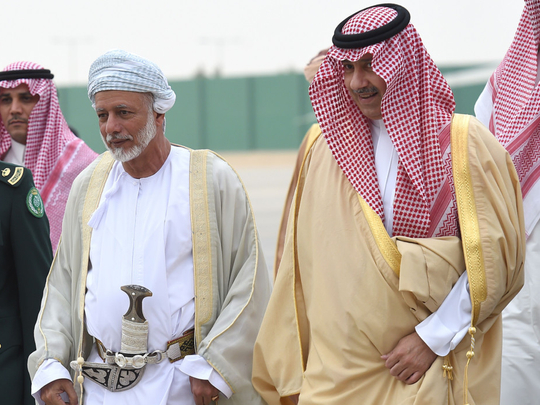
Sana’a: Yemen’s neighbours urged the UN on Saturday to move forcefully over the deteriorating security situation, saying they will themselves act if the rival factions there do not resolve their differences.
The call, at a meeting in Riyadh of the Gulf Cooperation Council, came as the Al Houthi rebels behind a power grab in Yemen fired live rounds to disperse thousands of protesters.
Home to Al Qaida’s deadliest branch and a key US ally in the fight against the group, Yemen has descended into chaos since the militia seized Sana’a in September. Matters worsened last month when they ousted the government.
Foreign ministers of the six GCC member countries urged the “UN Security Council to take a decision under Chapter Seven of the United Nations Charter”, which allows the use of military force if there are threats to peace.
They also asked for an urgent meeting of the Arab League and of the Organisation of Islamic Cooperation.
In a final communique, they called for immediate international steps to “guarantee the safety of President Abd Rabbo Mansour Hadi and Prime Minister Khalid Mahfoudh Bahah as well as other officials” who have been under de facto house arrest since January.
UN Secretary-General Ban Ki-moon has warned that Yemen is falling apart and said the Western-backed Hadi should be restored to power.
The GCC also called on world powers to reject a “constitutional declaration” by Al Houthis a week ago, under which they dissolved the government and parliament and tightened their grip on power.
They said they hope ongoing UN efforts in Yemen will lead to an agreement by all parties there based on “preserving legitimacy” and “resuming the political process”.
Failing that, and without elaborating, they said they would take “measures that will enable them to preserve their vital interests in Yemen’s security and stability”.
In the city of Ibb, which the Al Houthis have held since last year, protesters chanted: “Al Houthi, Iran: Yemen is not Lebanon!”, in a reference to Iran’s alleged support for the militia.
Witnesses said at least six people were wounded when Al Houthi rebels fired warning shots to disperse the protest.
Similar demonstrations took place in the city of Dhammar, which is also under Al Houthi control, and the southern city of Daleh, where protesters demanded political parties end their UN-brokered talks with the militia in Sana’a.
In the capital, hundreds protested describing the militia as “gangs that could not build a state”.
Meanwhile, the family of demonstrator Saleh Awad Al Bashiri, detained by the Al Houthis on Wednesday at a protest against their takeover, said he had died of torture wounds suffered in captivity.
Another two protesters who were held with Al Bashiri have been hospitalised after being found wounded and left on a street.
The families posted pictures on social media they said were of their sons, showing parts of their bodies bruised and swollen from beatings.
On Sunday, the Al Houthis announced a ban on all demonstrations against them unless they are authorised by the interior ministry, which itself is now under their control.
The Al Houthis have been accused of attacking and detaining protesters as well as reporters covering demonstrations against their power grab.
Meanwhile, more countries shut their embassies in Sana’a, with Spain and the UAE becoming the latest to announce on Saturday they had suspended operations at their missions.
The UAE foreign ministry said it has also evacuated all staff, following a similar move by Saudi Arabia.
“This decision comes in light of the increasingly deteriorating political and security situation” and the “unfortunate events with Al Houthis undermining legitimate authority in the country”, the UAE said in a statement carried by the official WAM news agency.
The United States, France, Germany, Italy, Britain and the Netherlands have also closed their embassies and withdrawn staff for security reasons.
Spain said it was temporarily suspending embassy activity in Yemen “in light of the current situation of insecurity and instability in Sana’a”.
Madrid’s embassy had advised all Spanish citizens to “temporarily” leave Yemen, the foreign ministry said.
The Turkish foreign ministry also “strongly” advised its citizens to leave.
The Al Houthis had said Western powers had no reason to shut their embassies, insisting that security was solid in the capital.
Tehran also criticised the “hasty action” of closing embassies, insisting the Al Houthis were fighting “corruption and terrorism”.
Following consultations in New York on Thursday, Britain said it would work with Jordan on a resolution to outline the Security Council’s stance on Yemen.












